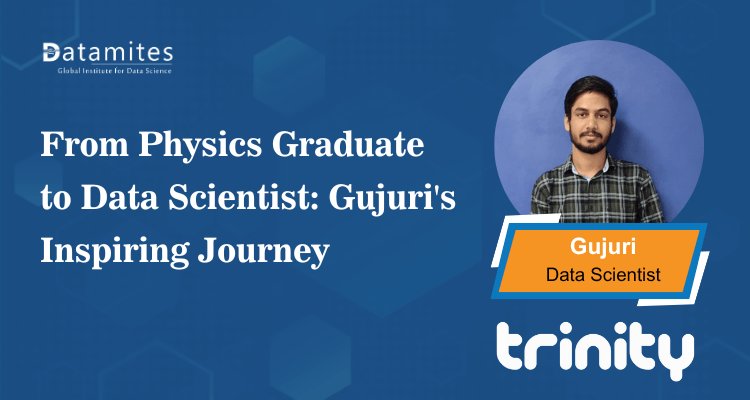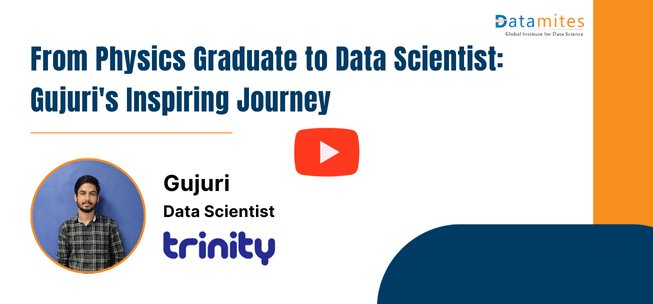From Physics Graduate to Data Scientist: Gujuri's Inspiring Journey
Gujuri Alekha, a physics graduate, successfully transitioned into a data science career through dedicated learning and hands-on training at DataMites. His journey highlights the power of persistence, practical exposure, and quality mentorship in breaking into the tech industry.

Data science has become one of the most promising and fastest-growing career paths today. Despite global economic uncertainties, the demand for skilled data scientists remains strong. Recently, Datamites hosted a live success story session featuring Gujuri Alekha, who successfully transitioned from a Bachelor of Science in Physics to an Associate Data Scientist at Trinity Mobility. This inspiring journey demonstrates how focused learning, perseverance, and the right guidance can transform career aspirations into reality.
Gujuri Alekha completed his Bachelor of Science in Physics in 2021 and initially aimed for higher education and competitive exams. When those plans didn’t pan out, he turned to the rapidly growing field of data science, which aligned well with his strong mathematical background and interest in coding. He joined Datamites in early 2023, completed the course, worked on multiple projects, and recently landed a job as an Associate Data Scientist at Trinity Mobility. Let’s explore his journey and uncover the valuable lessons it offers.
Gujuri Alekha’s Data Science Journey: Mapping Success with DataMites
Discover how Alekha transformed challenges into opportunities through learning, projects, and persistence.
Q1: When did you get placed, Alekha?
Just recently, I received the offer from Trinity Mobility, and I’m excited to share my journey here.
Q2: Could you tell us about your educational background and how you decided to pursue data science?
I graduated with a Bachelor of Science in Physics in 2021. Initially, I prepared for master's entrance exams but couldn’t clear them. Some friends suggested I explore the IT field. I researched and found data science growing rapidly and suitable for my skills in mathematics and coding. That led me to join Datamites Institute.
Q3: Why did you choose data science specifically?
Physics involved working with small datasets and a lot of math concepts like linear algebra and gradients. I wanted to apply those skills practically. While I considered other tech fields like software development, they seemed too complex initially. Data science was a perfect fit—it combines math, statistics, and coding in an applied way, which really attracted me.
Q4: When exactly did you start your data science journey?
I decided in late 2022 to switch to data science and joined Datamites in January 2023. So, my learning journey officially started then.
Q5: How was your learning experience with Datamites? Could you describe the progression through different topics?
The first day, I was very excited after the introductory session explaining what data science is. We started with Python programming, which felt simple initially—I even wrote my first "Hello World" program easily! Later, I learned Python data structures, functions, and then moved on to statistics and machine learning. It was challenging at times, but continuous practice helped me gain confidence.
Q6: How much time did you dedicate daily for learning and practicing?
The sessions were about two and a half hours each day. Initially, I made a mistake of not practicing enough after classes, which slowed my progress. Once I realized that, I started practicing Python coding daily, solving problems, and reinforcing concepts. That helped me get back on track within one or two weeks.
Q7: Did you find machine learning difficult to learn?
Not really. Once I understood the concepts and algorithms, it became manageable. The mentors explained everything clearly, which made machine learning feel simple and applicable.
Q8: Were you asked about the mathematics behind machine learning in your interviews?
N9, not really. In the past, interviews focused heavily on math and formula derivations, but nowadays, companies look for applied knowledge—how to implement machine learning techniques and solve real problems. That worked to my advantage.
Q10: How long did it take you to become job-ready after completing the course?
Since I was practicing coding and projects alongside the course, it took me about five to six months to confidently apply for jobs and clear interviews.
Q11: What projects did you work on during your learning at Datamites?
I worked on several projects covering key algorithms like linear regression and logistic regression. Datamites provided four capstone projects and two placement projects. For example, I worked on a self-effectiveness project and a bank credit scoring project. These projects taught me how to apply techniques practically and improved my problem-solving skills.
Q12: What kind of interview questions were asked by Trinity Mobility?
They asked about the basics of machine learning, its working principles, and the algorithms I used in my projects. They also gave scenarios to choose between supervised, unsupervised, or reinforcement learning algorithms. Additionally, questions about data analysis functions like group by and aggregation were asked.
Q13: How many interviews did you attend before landing your current job?
I appeared for two main interviews. The first one I failed the technical round, but the second one, with Trinity Mobility, I succeeded.
Q14: What went wrong in the first interview?
They asked me to write a Python program that uses regular expressions to count how many times each word appears in a given text. I struggled with the coding and got rejected. This failure made me realize the importance of consistent coding practice.
Q15: How much did your projects help you in interviews?
Immensely. Working on more than 10 projects, following proper data preprocessing steps like encoding and scaling, helped me confidently explain the process and solutions during interviews.
Q16: What do you think differentiated you from others who took longer to get placed?
I focused deeply on understanding the concepts and practicing a wide range of projects. This gave me insight into real-world problems and suitable algorithms, which I believe made me stand out.
Q17: What message do you have for aspiring data scientists who are watching you today?
Stick to the course material provided by Datamites and practice regularly. Understand the core concepts in statistics and machine learning, and work on projects to apply your knowledge. Avoid getting distracted by too many outside resources. Practical application is key.
Q18: Many aspirants worry about their communication skills. How important do you think communication is in data science interviews?
While good communication helps, it's not about perfect English. The key is to clearly articulate your understanding of concepts and your approach to solving problems. Confidence and clarity are more important than perfect grammar.
Q19: How do you practice coding for interviews?
After class, I revisited the recorded sessions and the course notes. I also created a simplified reference of key concepts and practiced coding problems daily. Writing clean functions and understanding Python basics were crucial.
Q20: How long is the typical duration of the Datamites Certified Data Scientist course?
The course duration depends on the batch, but for me, it was around five to six months including practice and projects.
Q21:Do employers expect deep theoretical knowledge or applied skills?
Employers now focus more on applied skills—how you implement machine learning and handle data problems—rather than deep theoretical math behind algorithms.
Q22: What advice would you give about balancing course learning and self-practice?
Attending classes is important but supplement it with regular coding practice and project work. Don’t waste time after classes—use it to reinforce your learning and solve problems.
Q23: Any final thoughts for future data science professionals?
Believe in yourself, be consistent, and focus on practical learning. Data science can be challenging but with dedication, you can succeed. Follow a structured path like Datamites and don’t get discouraged by initial failures.
Refer these articles:
- Ayush Mehta’s Journey from Engineer to Data Scientist
- Mechanical Engineer to Data Scientist: The Journey of Vishwas
- Non-Tech to Data Science: Dinesh’s Inspiring Path
Insights from Gujuri Alekha's Path to Data Science Mastery
Discover how determination, continuous learning, and practical experience propelled Gujuri Alekha from physics graduate to data science expert.
- Buji started his career with a degree in physics, not in computer science or data science.
- He was initially unsure about how to transition into the data science field.
- Online courses and tutorials were instrumental in building his foundational knowledge.
- Self-study was critical due to lack of formal data science education in his background.
- Working on real-world projects helped him apply theoretical knowledge practically.
- Buji completed internships to gain industry exposure and relevant experience.
- Building a strong portfolio showcasing his projects helped attract potential employers.
- Networking within data science communities and attending meetups broadened his opportunities.
- Persistence despite initial setbacks played a key role in his eventual success.
- He continuously updated his skills to keep pace with rapidly evolving technologies.
- Buji’s story emphasizes the importance of adaptability in career transitions.
- Soft skills like communication and teamwork were important alongside technical expertise.
- He demonstrated that a non-technical degree is not a barrier to entering data science.
- The growing demand for data scientists makes it a promising career for diverse academic backgrounds.
Refer these articles:
- Data Science Course Fees in Bengaluru
- Data Science Course Fee in Pune
- Data Science Course Fees in Kolkata
Gujuri Alekha’s journey from a physics graduate to a successful data scientist is a testament to the power of persistence, guided learning, and practical experience. His story underscores how aspiring professionals can pivot their careers by focusing on core concepts, disciplined practice, and real-world projects.
If you’re considering data science, take inspiration from Gujuri's experience and remember: the right training, consistent effort, and confidence in your skills can open doors to exciting opportunities in this dynamic field.
If you're contemplating a transition into data science, there's no better time than now to upskill. According to Precedence Research, the global data science platform market size was valued at USD 150.73 billion in 2024, grew to USD 175.15 billion in 2025, and is projected to surpass USD 676.51 billion by 2034, registering a healthy CAGR of 16.20% between 2024 and 2034. This rapid growth, fueled by the explosion of digital data across sectors, makes it crucial to choose a training institute that emphasizes hands-on learning, real-time internships, and strong placement support. Enrolling in a well-regarded data science course in Pune, Bangalore, Hyderabad, Chennai, Mumbai, and Delhi can set the foundation for a thriving tech career.
DataMites has emerged as a premier training provider in Data Science, AI, Machine Learning, Python Development, and Data Analytics. Accredited by IABAC and NASSCOM FutureSkills, DataMites combines expert-led training with practical project work and dedicated placement assistance, enabling seamless career transitions into the data domain.
With offline Data Science training in Pune, Bangalore, Hyderabad, Chennai, Ahmedabad, Coimbatore, and Mumbai, along with flexible online programs, DataMites ensures accessibility for learners from diverse backgrounds. Its industry-relevant curriculum empowers freshers, working professionals, and career switchers with the tools needed to succeed in data-centric roles.
Gujuri Alekha’s inspiring transformation from a non-tech academic background to a data science professional is a testament to what's possible with the right guidance and learning environment. His journey shows that with mentorship, hands-on experience, and determination, anyone can pivot into the world of data science and unlock new career opportunities.

